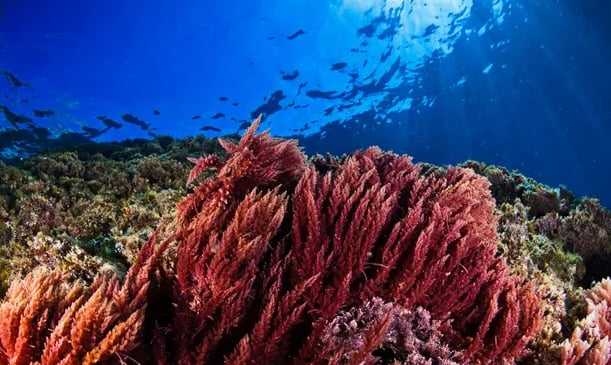November 28, 2025 | 01:06 GMT +7
November 28, 2025 | 01:06 GMT +7
Hotline: 0913.378.918
November 28, 2025 | 01:06 GMT +7
Hotline: 0913.378.918

The study suggests cuts to methane emissions from using Asparagopsis seaweed in human diets could save 2.6bn tonnes of CO2-equivalent a year by 2050. Photo: smovic/Getty Images/iStock
An area of ocean almost the size of Australia could support commercial seaweed farming around the world, providing food for humans, feed supplements for cattle, and alternative fuels, according to new research.
Seaweed farming is a nascent industry globally but the research says if it could grow to constitute 10% of human diets by 2050 it could reduce the amount of land needed for food by 110m hectares (272m acres) – an area twice the size of France.
But the authors of the research said there are a range of potential negative impacts on marine life that will need to be balanced with the benefits of a global seaweed farming industry.
The study looked at 34 seaweed species and where they could feasibly grow and then narrowed this down to places with calm enough waters and close enough to populations where farms could be established.
About 650m hectares (1,606m acres) was identified as plausible for seaweed farming, with the largest areas in Indonesia and Australia which both have large ocean regions under their economic control.
“Cultivating seaweeds for food, feed and fuel within even a fraction of the 650m hectares of suitable ocean could have profound benefits to land use, emissions reduction, water and fertiliser use,” the authors wrote.
Scott Spillias, a researcher at the University of Queensland in Australia who led the study published in Nature Sustainability, said: “People around the world are looking at the ocean as this big ‘untapped’ resource and asking if we should be using more of it.”
One of the biggest benefits, the study said, would be the cultivation and use of red Asparagopsis as a cattle feed supplement that has been shown to result in drastically lower methane emissions from cows. One supplement based on the seaweed reportedly went on commercial sale to farmers in Australia last year.
The study suggested cuts to methane emissions from using Asparagopsis could save 2.6bn tonnes of CO2-equivalent a year by 2050 – about the same as the current greenhouse gas footprint of India.
Spillias said introducing more seaweed into human diets could also deliver benefits. In parts of Asia, seaweed makes up 2% of diets, but scaling this up to 10% globally could spare 110m hectares of land currently used for growing food.
“Basically this is just people eating more vegetables,” he said. “If we grow seaweed, the best thing to do is for people to eat it rather than feed it to livestock, but that’s going to need some big cultural shifts.”
The nine authors, from Australia and Austria, said more work is needed to understand the costs and benefits of any boom in seaweed farming, but “the magnitude of potential benefits supports the notion that seaweed farming in the ocean can play a pivotal role in our response to global sustainability challenges.”
A review in 2019 of the risks of expanding seaweed farming in Europe highlighted concerns farms could upset the balance of marine ecosystems and could alter the way water around coastlines moves.
“Converting even a few million hectares means a huge amount of development,” Spillias said. “We are modifying habitats and introducing materials to places where we haven’t before.
“A lot of seaweed farming now is using plastic ropes and nets and we know the impacts of plastic on the ocean. If this is done on a large scale we need to find better materials.”
He said if there was a widescale push globally for seaweed farming, there could be social implications.
“Marine industries do not have a great reputation on human rights and if we’re farming seaweed largely out of sight, then we need to think of the people in these industries and make sure they’re being fairly treated,” he said.
(The Guardian)

(VAN) A new study reveals how the simultaneous effects of ocean acidification, salinity and loss of oxygen are making the world more fragile.

(VAN) Hopes are growing that the creation of the first 3D turkey gut model could be a turning point in the battle against the virulent blackhead disease.

(VAN) Tyson, America’s biggest meat supplier, plans to shutter one of its largest beef processing plants as the industry continues to struggle with low cattle supplies and political pressure from Washington.

(VAN) New FAO study shows how digital solutions are empowering farmers and fishers to prevent losses and build resilient agrifood systems.

(VAN) Brazil's COP30 presidency pushed through a compromise climate deal on Saturday that would boost finance for poor nations coping with global warming but that omitted any mention of the fossil fuels driving it.

(VAN) Poultry farmers in the UK have been warned that they could face one of the worst winters yet for bird flu.

(VAN) Prices of main-crop paddy have risen sharply, with jasmine rice hitting 16,100 baht per tonne — the highest level in years.